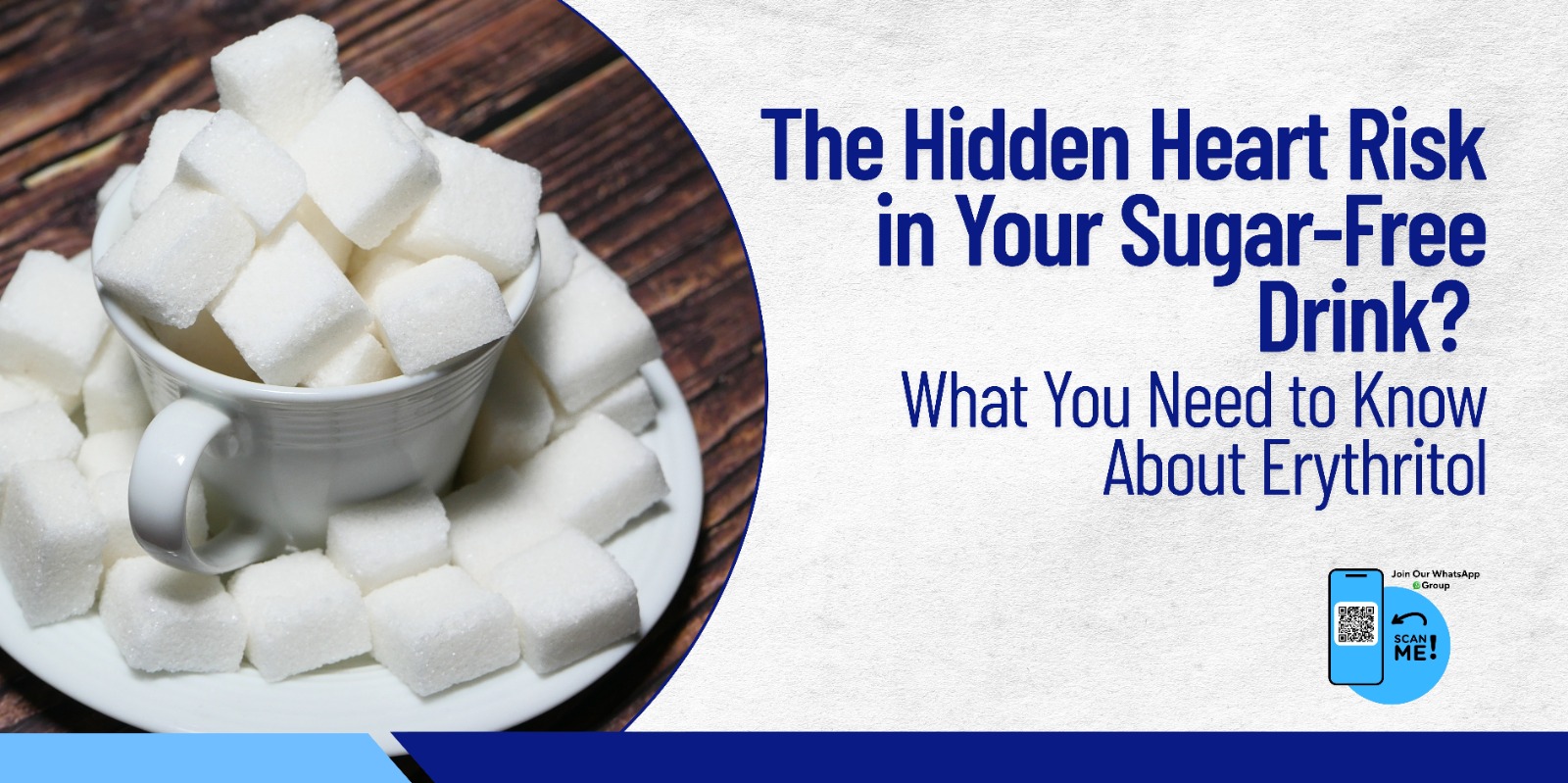The Hidden Heart Risk in Your Sugar-Free Drink?
Written By: Dr. Janhvi Ajmera

New Research Links Popular Sugar Substitute to Heart Attack and Stroke Risk
As medical professionals, we often recommend sugar substitutes like erythritol for patients battling diabetes, obesity, or metabolic syndrome. But what if the very sweetener marketed as “healthy” is quietly increasing cardiovascular risk?
A groundbreaking study has raised an urgent red flag: elevated blood levels of erythritol a widely used zero-calorie sweetener are linked to a significantly higher risk of major adverse cardiovascular events (MACE), including heart attack and stroke.
What Did the Study Find?
Researchers analyzed data from over 4,000 individuals across U.S. and European cohorts. Here’s what they discovered:
- Erythritol levels were significantly higher in individuals who later experienced MACE.
- The highest quartile of erythritol in plasma was associated with a 2-4x higher risk of heart attack, stroke, or death.
- These findings were independent of traditional cardiovascular risk factors, such as diabetes, hypertension, and high cholesterol.
And it doesn’t stop at correlation.
The researchers went a step further to uncover how erythritol could increase cardiovascular risk and what they found was alarming.
How Does Erythritol Affect the Body?
When healthy volunteers consumed just 30 grams of erythritol, equivalent to a serving of “keto” ice cream or a sugar-free drink, plasma levels spiked 1000-fold and stayed elevated for over 48 hours.
At those levels, platelet reactivity soared.
Mechanistic studies in humans and mice showed:
- Increased platelet aggregation in response to triggers like ADP and thrombin.
- Enhanced clot formation in microfluidic assays and in vivo thrombosis in animal models.
Simply put: erythritol appears to create a pro-thrombotic environment, potentially tipping the balance toward blood clots.
Why It Matters to Physicians & Researchers
This study urges us to rethink what we label as “safe” in our dietary guidelines.
- Erythritol is FDA- and EU-approved.
- But regulatory approval is based on short-term studies and animal data, not long-term cardiovascular outcomes in humans.
While it’s easy to focus on glucose control, this data reminds us to look at the whole picture. For vulnerable patients, those already at higher risk of cardiovascular events, the chronic use of erythritol might be doing more harm than good.
Clinical Takeaways
For clinicians:
- Reassess routine recommendations for erythritol in diabetic and obese patients with cardiovascular risk.
- Educate patients on the hidden sources of erythritol in “keto” snacks, sugar-free drinks, protein bars, and gum.
For researchers:
- This study highlights the value of metabolomics in discovering novel biomarkers of cardiovascular risk.
- Future work must explore erythritol’s interaction with platelet biology, renal clearance, and endothelial function.
Big Picture: More Sweeteners, More Questions
Artificial sweeteners have long been sold as “guilt-free” alternatives. Yet, as the body of evidence grows; from saccharin and sucralose impairing glycemic control, to erythritol elevating clot risk, we must ask:
Are these sweeteners merely replacing calories… or replacing one risk with another?
Final Thoughts: A Call for Caution and Further Study
Erythritol might still have a role, but its blanket use as a healthy alternative needs reevaluation. Especially for our high-risk patients, long-term safety trials are urgently needed.
Reference:
_________________________________________________________________________
